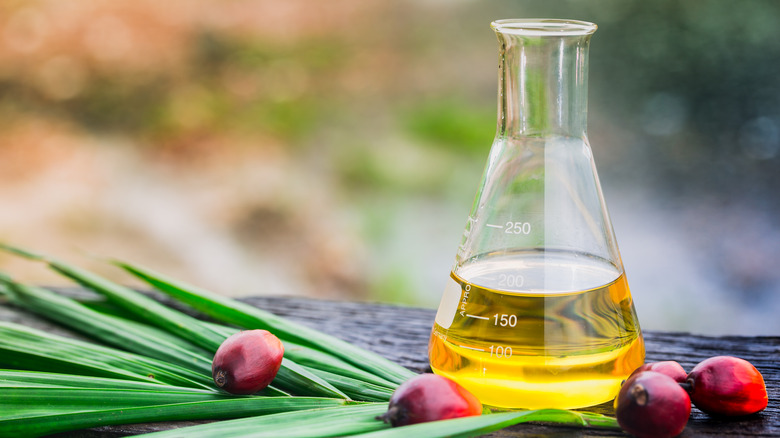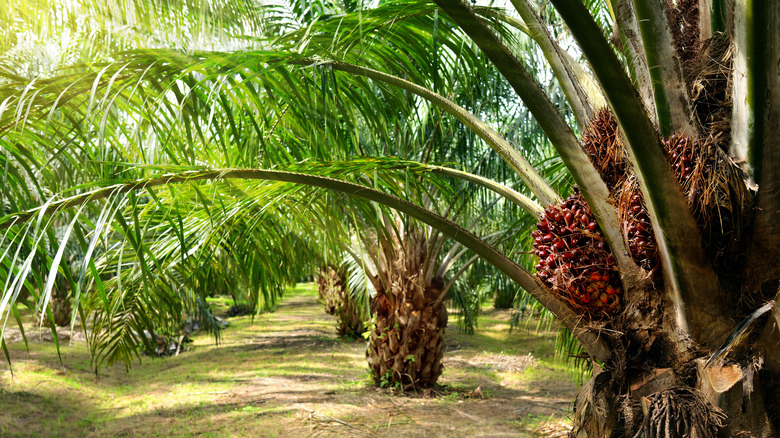The Real Reason Palm Oil Is Rooted In Controversy
The term "well-oiled machine" applies to many things in life, indicating something that functions efficiently due to careful coordination and expertise. When applying that principle to the kitchen, "well-oiled" suddenly takes on new meaning. The typical home chef uses cooking oil on a regular basis, often as an afterthought — but the type of oil that fuels our recipes can affect the smooth operation of home and body, leading to a well-balanced life.
The range of readily available oils at our disposal these days can be overwhelming, but for most of us, it essentially comes down to taste and smoke points for controlling heat levels, right? Not exactly. Some oils have considerably higher nutritional value, while others contain harmful components such as saturated and trans fats, according to The American Heart Association (AHA). And that's not all.
Palm oil in particular provokes a slew of negative warnings by health professionals, including an increased risk of cancer, per Healthline. But as bad as that sounds, it's not the only reason to think twice about palm oil consumption. On a wider scale, controversy brews, bubbles, and erupts over very contentious practices related to palm oil. Here's a look at the real reason palm oil is rooted and mired in controversy.
Tangled roots dig deep
The World Wildlife Fund (WWF) explains that palm oil is a product made from the fruit of the Elaeis guineensis, or oil palm tree. Though native to Africa, Southeast Asia now grows the highest number of oil palms, with at least 85% of global palm oil supplies originating from Indonesia and Malaysia. Palm oil permeates our homes in the foods we eat and the products we use, hiding in an estimated 50% of packaged foods and daily-use items such as cosmetics, toothpaste, and hair products. So, what's the issue?
Smithsonian Magazine concurs with the WWF that the palm oil industry is a significant concern for climate change and deforestation; the process of converting land for palm oil plantations releases about 100 times more greenhouse gases into the atmosphere than standard forest fires, simultaneously destroying rainforests, biodiverse woodlands, and peatlands. The process also displaces indigenous populations, negatively impacts habitats for endangered species such as orangutans and pygmy elephants, and reportedly engages in worker exploitation and dubious child labor practices.
Alternative solutions to palm oil controversy
Despite all the reasons to avoid using palm oil, there's a flip side to consider. First of all, is it even possible to eliminate this deeply rooted oil from food and personal-care markets? A reality check from Smithsonian Magazine points out palm oil's entrenchment in society while noting that the alternatives could be just as bad in some ways. Since oil palm trees provide far more oil per acre than other oil types, it commands less growing acreage, also requiring fewer fertilizers and lower amounts of pesticides to maintain than corn or coconut crops. A boycott of palm oil could merely shift environmental problems onto other products that would fill the void, or encourage the use of oils containing unhealthy partially hydrogenated trans fats.
Environmentally sustainable solutions include planting palm oil trees on already deforested land and adhering to established Roundtable on Sustainable Palm Oil (RSPO) standards. Major U.S. food corporations such as ConAgra, General Mills, and PepsiCo have made varying forms of commitment to protecting forests and peatlands in relation to the palm oil industry, according to a 2015 report by the Union of Concerned Scientists. Others straddle the line between profits and social accountability.


